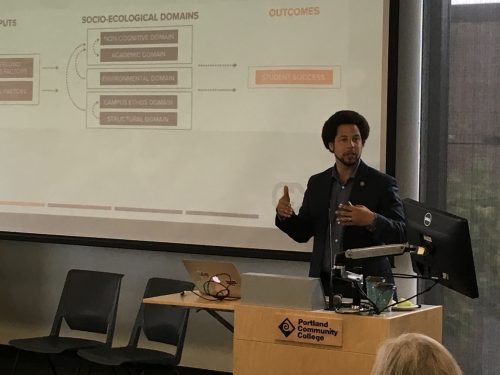This content was published: June 11, 2019. Phone numbers, email addresses, and other information may have changed.
National leader on equity visits Men of Color Program at Cascade Campus
Photos and Story by Abe Proctor
“What derails equity?” asked J. Luke Wood to a crowd at Portland Community College’s Cascade Campus.
Wood, the associate vice president for faculty diversity and inclusion at San Diego State University, was speaking at a daylong gathering called “Teaching and Supporting Men of Color: Moving From Theory to Practice,” convened by the campus’ Men of Color Center for Excellence in Education Program. The event brought together educators from PCC, Portland Public Schools, and Lewis & Clark and Reed colleges to discuss ways in which they could effectively surmount the many systemic obstacles that stand between young men of color and educational success.

J. Luke Wood of San Diego State University delivers the keynote address at the recent “Teaching and Supporting Men of Color: Moving From Theory to Practice” event at the Cascade Campus.
In addition to Wood’s keynote address, the gathering included panel discussions featuring both educators and students of color, as well as remarks from College President Mark Mitsui, Cascade Campus Diversity Manager Randolph Carter, and a presentation by Men of Color Program co-founders General Johnson, Clifford Meeks, and Alexander T. McPherson.
And the answer to Wood’s question? He said, “The perception that equity means lower standards. We have to move away from the deficit frames which encourage us to blame students for the barriers they face.”
This notion of moving away from a framework which sees students of color, particularly young men of color, as damaged rather than simply confronted by an array of systemic barriers is at the heart of the Men of Color Program’s mission, and the purpose of the “Teaching and Supporting Men of Color” gathering.
“Dr. Johnson and Dr. Meeks have developed an asset-based approach as opposed to a deficit frame,” explained McPherson, program specialist with the program. “We use an asset-based assessment paradigm with our students, and we are constantly self-assessing our efforts as practitioners and engaging in reflective inquiry to make sure we are being effective. The assessment of efforts for men of color needs to be dynamic and holistic, not just an accounting of test scores or a perceived ability to succeed in reading or math.”
The program also works to address institutional barriers through leading anti-bias trainings for faculty and staff who work with and teach men of color.
“Dr. Johnson and Dr. Meeks understand that a student-centered approach goes beyond direct student service,” McPherson said. “It requires proactively engaging across departments, offices, and administration to develop dynamic solutions to address dynamic problems.”
Cascade’s Men of Color Center for Excellence in Education Program takes into account a student’s background, lived experience, innate talents and interests, previous experiences in the educational system and his encounters with the many obstacles that can confront people of color in American life.
McPherson said these barriers can take a number of familiar forms like poverty, food insecurity, housing insecurity, turbulent childhoods, substance abuse, and encounters with the criminal justice system. Any of these students in the program may have experienced one, some, or many of these factors, he added.
He explained the key to helping them toward academic success is engagement.
“Students who are engaged with their peers, their instructors, their community are motivated to reflect on their purpose, which in turn helps them to learn who they are and what they want from their lives,” McPherson said. “We’re not just engaging them to earn a credential or a degree, we’re engaging them to be a whole person.”
This engagement takes place on a number of levels. The Men of Color Program utilizes a cohort model, which enables them to both provide social and emotional support for one another, as well as reinforce one another’s academic success. They receive assistance in acclimating to and navigating life on a college campus, which can sometimes be overwhelming at first. They are coached on developing good study, organizational, and life habits. They receive personalized academic advising, helping them to choose an academic path that best meets their needs and objectives.
And most importantly, the students receive one-on-one guidance from older mentors who have similar life experiences. The knowledge that someone cares about them, about who they are and where they are going, who has faced many of the same challenges, can make all the difference in both academics and in life, McPherson said.
“Our students will face structural challenges no matter what, but we don’t see lived experiences as a deficit. We build real relationships with them, and help them build real relationships with their community,” he said.
To learn more about the Men of Color Center for Excellence in Education Program, call (971) 722-5793.


This work has been and continues to be a strategic effort to deliver and sustain high quality programming for students and the staff/faculty who support them.
We are grateful for the opportunities to continue to lay the foundation for systemic shifts in how PCC serves its students.
Thank you President Mark Mitsui, Dr. Karin Edwards, Dr. Johnson, Dr. Meeks, Phil Christian, and so many more who have contributed to the founding and launching of the Center!